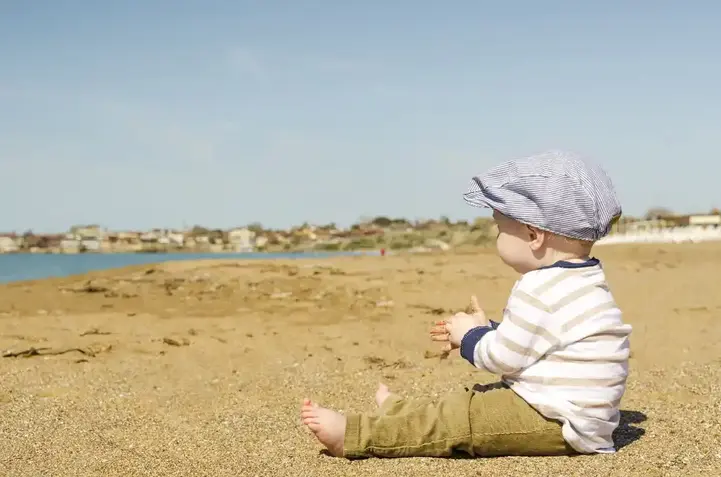Your baby is thick? 5 ways to develop empathy
Most children are characterized by innocence, kindness, and assuming good faith in others that you will notice that they always empathize with others in most situations. If a child sees another crying child, he may start crying, offer him a piece of candy, or simply be tied on his shoulder, even if the child is a stranger.
Show key points
- Empathy is not an innate trait but a skill that children can learn through observation and guidance.
- Children naturally begin to recognize and respond to emotions between the ages of 4 to 6 months, and their emotional awareness grows during preschool.
- A child’s home environment and parental interactions play a significant role in shaping their understanding of emotions and empathic responses.
- ADVERTISEMENT
- Modeling empathy through your own behavior, such as showing kindness and understanding, is the most effective way to teach children empathy.
- Engaging in imaginative play allows children to explore emotional scenarios and practice appropriate responses in a safe, enjoyable context.
- Encouraging your child to care for a pet fosters compassion and helps them recognize the needs and feelings of others.
- Using daily situations, like conflicts over toys or encounters at the park, provides real-life opportunities to teach children how to respond empathetically.
Empathy is a skill a child can learn and is not something that is done by nature alone. So, if you notice that your child is too thick and difficult to empathize with others, you can teach your child the skill of empathy, this article will discuss some tips that can help you achieve this, but let's understand empathy better first.
Empathy is twofold, the first is the ability to imagine what the other is feeling in a given situation and the second part is to respond to these feelings properly. From this simple definition you can clearly understand that children with delayed abilities, limited mental skills, or mental or psychological disorders will find it difficult to empathize with others. We can also understand that the response part translates into behaviors that the child will perform in those situations and therefore, it is a skill that the child needs to learn since the behavior is acquired and not innate.
Recommend
Children begin to understand different emotions at the age of 4:6 months and gradually develop and their feelings grow towards parents and close ones first and then during nursery age children begin to develop their social relationship. The nursery child "preschool age" begins to interact with peers and understand their various feelings.
It starts at home. Accepting your child and understanding of him and his feelings helps him understand the feelings of others. Babies start observing parents from the age of 7 months and simulating their reactions as if it were a personal signal sent to them. When a guest visits the house, you will notice that your child is watching how you deal with the guest, if he feels stressed or shows signs of distress, he will understand that the guest is untrustworthy. From the age of two, the child begins to understand the uniqueness of his feelings from the feelings of others.
1. Empathize with your child

The first step to teaching a child any skill is for the child to notice it in you first, children mimic the behaviors of their parents and older sisters. If parents treat the child with harshness, it is certain that the child will develop a harsh behavior towards others.
While walking down the street with your child, a road dog passed by and started barking at your child, the child felt scared and started crying or screaming, your reaction is essential. Will you get angry and bully the child or will you talk to him calmly and start reassuring him? The appropriate response to the situation is to accept the child's feelings and simply explain to him "Darling, this dog is cute but his barking sound is annoying, you have every right to feel afraid... How about I carry you until the dog passes away.
2- Teach your child to be sensitive to the feelings of others

Discuss with your child the feelings of others when they are not paying attention. While your child was playing with another child, you noticed that your child took the toy from the other child violently and the other child started crying but your child completely ignored him and continued to play with the toy. You will explain to your child how the other child felt when the toy was taken from him by force and suggest that your child repeat the toy and play with another toy until the toy is available. Your child must understand that other people's feelings are also important and that their desires and feelings are not always the priority. Ask him how it would feel if another child grabbed his toy and explain that those feelings are also the right of others.
Suggest appropriate responses to your child to deal with other people's emotions. When I took your child to play in the park, I noticed that he did not respond when one of the children fell and bruised. I suggest to your child that you bring a piece of ice and help the child in pain and take him to ask the other child about his feelings and reassure him that he will be fine.
3. Be a role model for your child

In the introduction we discussed how children mimic parental behavior. Being a sympathetic person greatly influences your child's behavior sympathetically with others. Helping couples especially during fatigue or illness sends a clear signal to the child of the need to interact with others especially during times of fatigue or suffering.
Take your child to visit patients, whether from your family or even by volunteering through nonprofits or children's shelters. Volunteering is one of the activities that greatly helps the child to understand and empathize with others, as it helps the child to appreciate his blessings.
4. I use supposed "imaginary" play
You can develop many skills using imaginative play, which children love so much. Through imaginative play, act out scenarios for imaginary situations close to reality and monitor your child's reactions. You can use toys like stuffed animals, make them characters and put them names with your child. By simulating real situations, the child begins to link the game to the life situations to which he is exposed and begins to notice the appropriate behaviors of different situations.
Imaginative play offers an acceptable way for the child to hear the right way to behave in different situations without preaching or bullying him in a way that injures or alienates his dignity.
5. Raising a pet

Raising a pet is one of the experiments that has proven very successful in addressing heavy-handed behavior and instilling a spirit of empathy in children. A child's empathy for a weak pet and observing the animal's various feelings of hunger, thirst or the need for love and attention helps the child develop a spirit of empathy for animals and humans as well.








